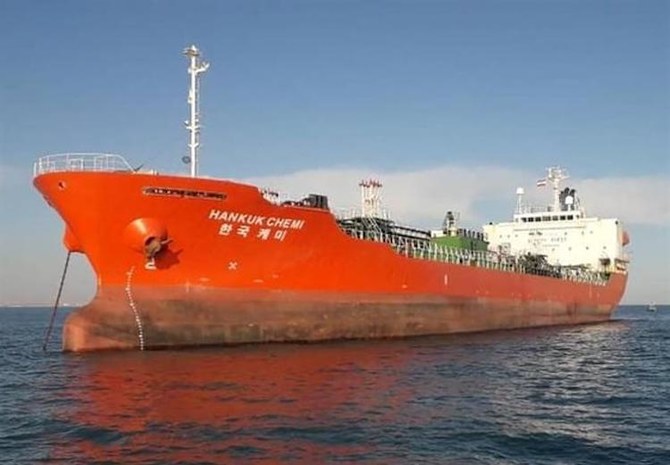SEOUL: The Foreign Ministry here confirmed on Wednesday that Iran had released all sailors on a South Korean-flagged oil tanker seized by Iranian forces in the Arabian Gulf, capping a month-long negotiation with Tehran.
However, the captain and the vessel, the MT Hankuk Chemi, will remain under detention as the Iranian judiciary investigates the tanker’s alleged marine pollution.
“Iran’s Deputy Foreign Minister Abbas Araghchi has informed us that the Iranian government decided to first release all sailors except for the captain,” the ministry said in a press release.
The ship with 20 crew members on board was sailing from Saudi Arabia to the UAE when it was intercepted by Iran’s Islamic Revolutionary Guard Corps (IRGC) on Jan. 4.
The Iranian authorities have claimed the ship violated environmental protocols, which the vessel’s operator denies.
The seizure of the oil tanker followed Iran’s complaint about the difficulty of transferring money from Seoul to purchase coronavirus vaccines, as the country’s $7 billion worth of assets in Korean bank accounts were frozen in the wake of a broken nuclear deal between Teheran and Washington in 2018.
First Vice Foreign Minister Choi Jong-kun had telephone talks with Araghchi a day earlier to discuss the release of sailors, according to a ministry spokesman.
Choi visited Tehran last month to secure the early release of the sailors.
During the 30-minute talks, both sides agreed to restore friendly ties by resolving issues surrounding the frozen money, the spokesman said, asking not to be identified.
“Deputy Minister Araghchi pledged to ensure the humanitarian treatment of the captain and guarantee sufficient consular assistance for him pending a judicial process,” he said.
In return, Choi pledged efforts to address the issue of frozen assets speedily, while continuing consultations with the Biden administration in the US, he said.
“We promised to do what we can unilaterally and seek support from the US government in a transparent manner,” the spokesman said.
In a bid to appease Iran, South Korea is expected to pay Iran’s overdue UN membership fees using its frozen assets at two South Korean banks.
A senior diplomat here confirmed on Monday that his ministry had received Teheran’s request over the UN membership fees.
Iranian Foreign Ministry spokesperson, Saeed Khatibzadeh, also revealed the proposal, urging the UN to guarantee the safe transfer of payments.
The Swiss Humanitarian Trade Arrangements (SHTA) is also seen as a method for sending locked Iranian funds in Korean banks to Switzerland to purchase humanitarian items for Iran.
Iran made a request in February last year that Seoul transfer $1 billion from the frozen assets using the SHTA method, and the Seoul government submitted a proposal to the US State Department and requested the exemption of sanctions in May.
The State Department has yet to respond to the request, according to the foreign ministry.
Seoul and Tehran established strong economic ties, with South Korea the third-largest importer of Iranian oil, in 2017.
South Korea was the biggest buyer of Iranian condensate, which its petrochemical industry processed in refineries designed to handle the commodity.
After the Trump administration reimposed sanctions against Iran, however, South Korea’s oil imports from Iran had plummeted from $7.8 billion to $2.1 billion by 2019.














